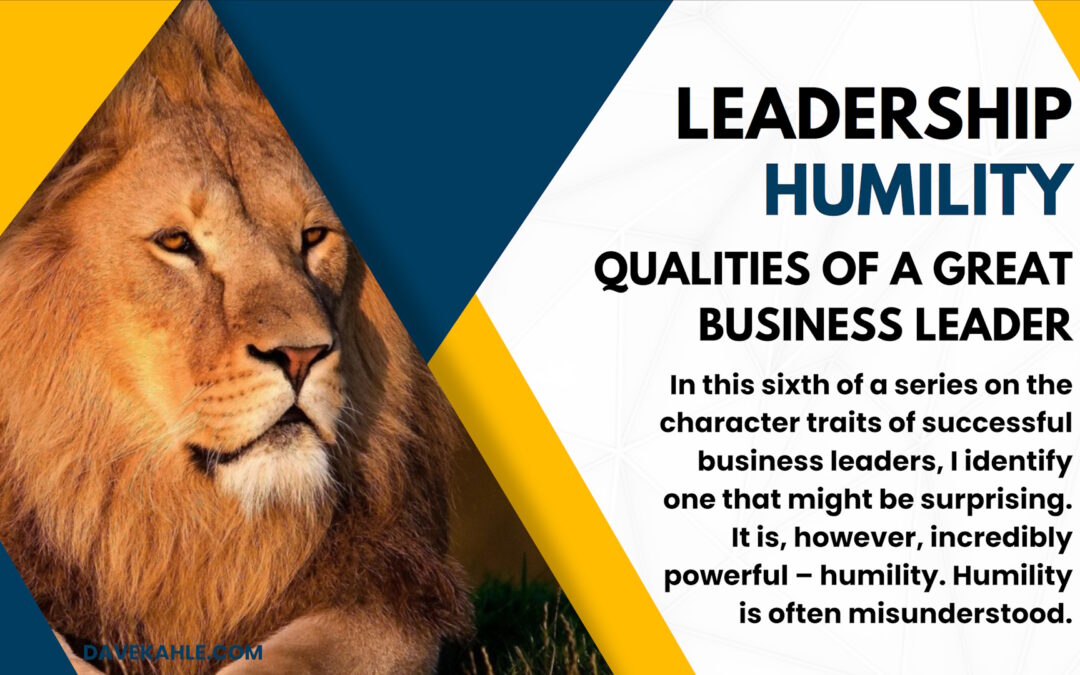In a previous post, I wrote that the qualities of a great business leader were a more important indicator of business success than the business model. First, a disclaimer. This is one person’s point of view. This is not the result of some study that surveyed 10,000 business owners. Instead, it is the result of my personal experiences. I’ve spoken to and with thousands of business executives in the US and other countries, and personally and contractually worked with over 459 of them. I believe I have achieved a breadth of experience in the world of business that, coupled with a touch of wisdom, has a validity of its own.
In the past I wrote that these are qualities of a great business leader:
Ability and Propensity to Learn
To that list, I’m adding
A Pervasive Sense of Humility
On the surface, it seems like an unlikely quality for a leader. However, once understood, it becomes a bedrock trait and a powerful asset in the psyche of an effective business leader.
Humility – A Modest Estimate of One’s Own Importance
Synonyms include meek, deferential, and respectful.
It is often confused with a sense of weakness and feebleness, which is overly apologetic. There is nothing weak about humility. In fact, it takes far more strength to exhibit humility than it does to default to its opposite: Pride.
The greatest example comes from the pages of the Bible, and the story of Moses. He was tasked with one of the greatest leadership challenges of all time: To lead the entire nation of Israel – hundreds of thousands of men, women, and children with all their herds and possessions — out of Egypt through the desert and into the Promised Land. And the primary character trait that equipped this 80-year old leader for the task was humility.
“Now Moses was a very humble man, humbler than anyone else on the face of the earth.” – Numbers 12:3
Humility is not about feebleness or weakness. And, there is nothing phony about it. Rather, it is about having an accurate view of one’s own role, and an objective understanding of one’s own set of skills and characteristics. C.S. Lewis writes that the truly humble man “will not be thinking about humility: he will not be thinking about himself at all.”
Humility is prominent in both Christian and Jewish traditions. Unfortunately, it is a difficult topic to discuss outside of a spiritual domain. It is interesting that of all the world’s major religions, it is uniquely a Christian virtue. Humility is articulated and promoted by the writers of various books of the Bible. It’s embodied in the person of Christ.
It was Christ who said in Mathew 5:5,
“Blessed are the meek and humble, for they shall inherit the earth.”
That’s a pretty big promise, but indicative of the ultimate power of humility to influence others. There is something about humility that attracts people.
The humble person is easy to be around and speaks with an authenticity that is unusual.
There is, however, a quiet power that oozes out of humility. It attracts sincere people, gains influence and eventually subdues arrogant opposites.
Humility is the virtue that bridges the gap between our purely physical urges and the spiritual part of us. Clearly, there is something about humility that speaks to our higher nature.
But this post is not a treatise on the spiritual implications of humility, rather it speaks of the business advantages of it.
Why Is Humility a Quality for a Great Business Leader?
Whereas pride repels people, humility makes one approachable. There is something both attractive and compelling about a humble person. Since a truly humble person will “not be thinking of himself at all,” it implies that they think about others more. Whether we are employees, associates, vendors, or customers, we all feel a sense of importance from a leader with humility.
We feel free to voice our ideas comfortably and confidently, because they will be viewed on their own merits, and not compared to the leader’s own ideas
We feel free to try new things and are unafraid of failure because the humble leader accepts their own failures.


Trackbacks/Pingbacks